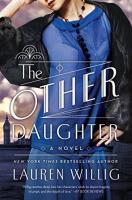
In 1920s France, British governess Rachel Woodley abruptly quits her job to return home to her ailing mother. Upon her arrival in England, she is devastated to find that her mother has already died. With no money, no remaining family, and her childhood home about to be swept from beneath her by a greedy landlord, Rachel is truly unmoored. Things become even more confusing when, among her mother’s things, she finds a photo from a current magazine of her father, whom she had been told died when she was a child. And, she discovers he's an earl with a wife and two other (recognized, legitimate) children. She travels to Oxford to seek some answers from a family friend. There she happens to bump into Simon Montfort, a gossip columnist and member of the privileged set himself. Simon, upon learning her story, offers to introduce her into high society by having her pose as his cousin Vera. While Rachel's initial plan is simply to speak to her father and get some answers, her motivations become complicated and muddier as time goes on. Does she want revenge? Or for him to acknowledge her as his daughter? Rachel's not sure and, to be frank, the reader often isn't either. Simon's alleged reason for the ruse, to create copy for his gossip column, may also be masking an ulterior motive.
This is a quick, light historical read. The writing style is fun and the characters are well-developed and interesting, particularly when the reader starts learning about all of their backstories. Because Willig is a Harvard-trained historian, the historical details are accurate, yet she deploys them with a light hand in a manner that serves to flesh out the setting and characters rather than to bog down the narrative with unnecessary information. Having said all that, readers familiar with romance novel tropes will recognize immediately who the "bad guy" is, and who Rachel will end up with in the end for her happily ever after.
Readers who have not read Willig's novels before may be interested in her recently-ended historical-spy-adventure-romance (yes, it's really all of those things!) series Pink Carnation, or her other two stand-alone novels, The Ashford Affair and That Summer. Similar tales set in the 1920s and centering around the revelation of family secrets include Kate Morton's The House at Riverton, Ask Alice by D.J. Taylor, and Laura Moriarty's The Chaperone.
